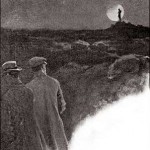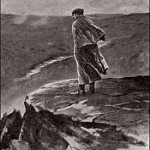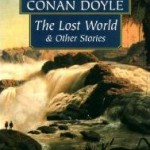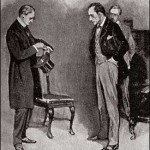“‘What’s this?’ he asked. He was a man of action, and a nasty chap to deal with when he had his topmasts lowered.
“‘We can’t get in,’ said the clerks.
“Where is Mr. Jelland?’
“‘He has not come to-day.’
“‘And Mr. McEvoy?’
“‘He has not come either.’
“Randolph Moore looked serious. ‘We must have the door down,’ said he.
“They don’t build houses very solid in that land of earthquakes, and in a brace of shakes they were all in the office. Of course, the thing told its own story. The safe was open, the money gone, and the clerks fled. Their employer lost no time in talk.
“‘Where were they seen last?’
“‘On Saturday they bought the Matilda and started for a cruise.’
“Saturday! The matter seemed hopeless if they had got two days’ start. But there was still the shadow of a chance. He rushed to the beach and swept the ocean with his glasses.
“‘My God!’ he cried. ‘There’s the Matilda out yonder. I know her by the rake of her mast. I have my hand upon the villains after all!’
“But there was a hitch even then. No boat had steam up, and the eager merchant had not patience to wait. Clouds were banking up along the haunch of the hills, and there was every sign of an approaching change of weather. A police boat was ready with ten armed men in her, and Randolph Moore himself took the tiller as she shot out in pursuit of the becalmed yawl.
“Jelland and McEvoy, waiting wearily for the breeze which never came, saw the dark speck which sprang out from the shadow of the land and grew larger with every swish of the oars. As she drew nearer, they could see also that she was packed with men, and the gleam of weapons told what manner of men they were. Jelland stood leaning against the tiller, and he looked at the threatening sky, the limp sails, and the approaching boat.
“‘It’s a case with us, Willy,’ said he. ‘By the Lord, we are two most unlucky devils, for there’s wind in that sky, and another hour would have brought it to us.’
“McEvoy groaned.
“‘There’s no good softening over it, my lad,’ said Jelland. ‘It’s the police boat right enough, and there’s old Moore driving them to row like hell. It’ll be a ten-dollar job for every man of them.’
“Willy McEvoy crouched against the side with his knees on the deck. ‘My mother! my poor old mother!’ he sobbed.
“‘She’ll never hear that you have been in the dock anyway,’ said Jelland. ‘My people never did much for me, but I will do that much for them. It’s no good, Mac. We can chuck our hands. God bless you, old man! Here’s the pistol!’
“He cocked the revolver, and held the butt towards the youngster. But the other shrunk away from it with little gasps and cries. Jelland glanced at the approaching boat. It was not more than a few hundred yards away.
“‘There’s no time for nonsense,’ said he. ‘Damn it! man, what’s the use of flinching? You swore it!’
“‘No, no, Jelland!’
“‘Well, anyhow, I swore that neither of us should be taken. Will you do it?’
“‘I can’t! I can’t!’
“‘Then I will for you.’
“The rowers in the boat saw him lean forwards, they heard two pistol shots, they saw him double himself across the tiller, and then, before the smoke had lifted, they found that they had something else to think of.
“For at that instant the storm broke—one of those short sudden squalls which are common in these seas. The Matilda heeled over, her sails bellied out, she plunged her lee-rail into a wave, and was off like a frightened deer. Jelland’s body had jammed the helm, and she kept a course right before the wind, and fluttered away over the rising sea like a blown piece of paper. The rowers worked frantically, but the yawl still drew a head, and in five minutes it had plunged into the storm wrack never to be seen again by mortal eye. The boat put back, and reached Yokohama with the water washing half-way up to the thwarts.
“And that was how it came that the yawl Matilda, with a cargo of five thousand pounds and a crew of two dead young men, set sail across the Pacific Ocean. What the end of Jelland’s voyage may have been no man knows. He may have foundered in that gale, or he may have been picked up by some canny merchant-man, who stuck to the bullion and kept his mouth shut, or he may still be cruising in that vast waste of waters, blown north to the Behring Sea, or south to the Malay Islands. It’s better to leave it unfinished than to spoil a true story by inventing a tag to it.”






